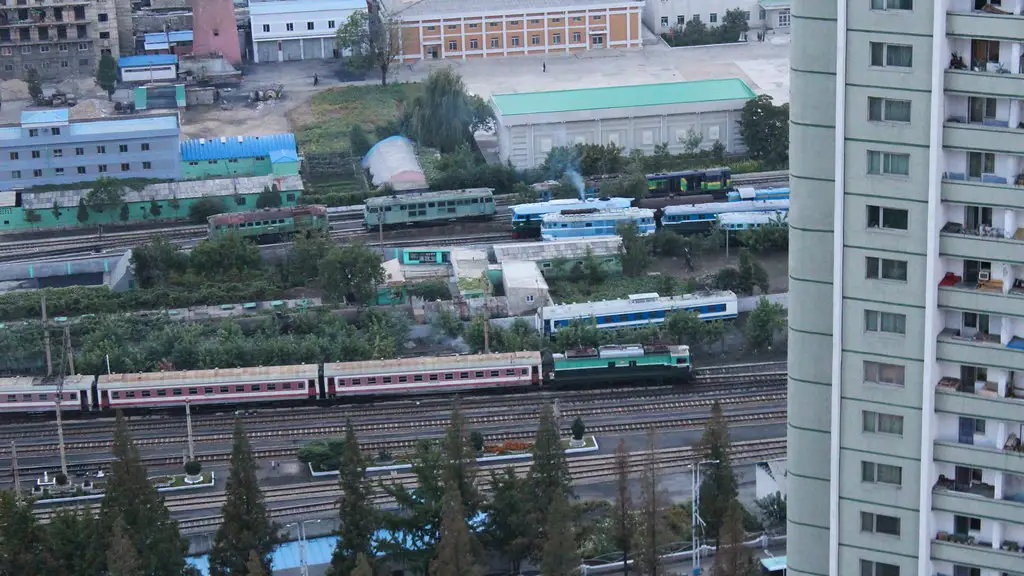Relationship between United States and North Korea
North Korea and the United States have had a strained international relationship for decades. After the Korean War ended in 1953, the United States and the former Soviet Union established a relationship of sorts with the North Korean government, at least in the diplomatic arena.
However, since then, relations have deteriorated significantly, producing considerable tension between the two countries and their respective allies. The root of this conflict actually dates back to World War II, as the Soviets had occupied North Korea, and later on, the United States occupied South Korea. Thus, the two countries have been separated ideologically since the divide of the Korean Peninsula.
Consequences of Decades of Discontent
It is important to recognize the fact that the United States and North Korea are geo-strategically close rivals, with different views and ideas in terms of world-order. In addition, North Korea’s ambitions to pursue nuclear proliferation has stirred up even more tension between the two countries.
The North Korean government continues to criticize the United States, mainly for its capitalist policy and frequent foreign interventions. They usually blame the U.S. for being a major hindrance to the reunification of the Korean peninsula, while also accusing it of imposing a nuclear threat over the North.
North Korea’s Nuclear Program
The North’s pursuit of a nuclear program is of great concern to the United States, as it could lead to tragedy if the nuclear weapons fall into the wrong hands. Given the conflict between the two countries, the U.S. has long warned North Korea to put its nuclear program on hold until an agreement can be reached.
The United Nations Security Council has also passed several sanctions targeting North Korea’s nuclear activities, aiming to pressure the country into giving up its nuclear ambitions. In response to these latest rounds of economic sanctions, North Korea has become even more belligerent, conducting several rounds of nuclear test in retaliation.
U.S. Sanctions on North Korea
Another major reason North Korea doesn’t like the United States is its policy of applying economic sanctions. Since the 1950s, the United States has imposed sanctions on North Korea in an attempt to pressure the regime into changing its ways. These sanctions have hit the North’s economy particularly hard, given its small size, lack of natural resources and limited access to international markets.
The sanctions have severely curtailed the North’s access to global markets, greatly reducing the influx of foreign currency and further exacerbating the country’s dire economic condition. Furthermore, the sanctions have also made it more difficult for the North Korean government to support their own development programs, as well as key social services.
U.S. Military Presence in South Korea
The United States has been present in South Korea for decades, hoping to keep a check on the North and hopefully to deter any aggression. The U.S. maintains a large permanent military presence in South Korea, comprising around 40,000 troops.
North Korea sees this as an encroachment on its sovereignty and a threat to its security. The presence of a foreign military force in the North’s backyard is seen as a provocation and an affront to the North’s autonomy. North Korea is afraid that any aggressive move by the United States may lead to a conflict on the Korean Peninsula, leading to a potential devastating war.
The Voice of North Korean People
The North Korean people have a strong sense of hatred and mistrust towards the United States. North Korean propaganda continually portrays the U.S. as an evil and oppressive force, with the intention to subjugate them. This has only further escalated the mistrust between the two nations.
The North Korean public usually blames the United States for the country’s economic privations and the difficulties that ordinary people have to suffer due to the economic sanctions. The U.S.’s policy of aggression and militarization is seen as a direct affront to the North and its people, making it even more difficult for the two countries to achieve any level of reconciliation.
United States’ Skewed Perception of North Korea
The US’s view of North Korea is often seen as one-sided and unfair. Many in the United States often perceive North Korea to be an authoritarian and rogue nation, due to its censorship of the press, lack of religious freedom and the denial of basic human rights. This has caused friction between the two nations, particularly in the diplomatic arena.
The United States often applies pressure on North Korea in an effort to force them to change their policies and practices. This, in turn, only furthers the North’s mistrust towards the US. Additionally, the heightened sanctions and economic pressure have only worsened the entirety of the situation, thus furthering the divide between the two countries.
A Lack of Diplomatic Dialogue
The lack of diplomatic dialogue between the two countries only further serves to prove the severity of their strained relationship. With neither side willing to give in, there seems to be no clear path to resolving the tension between the two sides.
The United States must recognize that dialogue is needed if any progress is to be made. North Korea should also be willing to take part in a meaningful process aimed at reducing the tension and restoring friendly relations between the two countries.
Impacts of Domestic Politics
In recent years, domestic politics in both countries has only further exasperated the situation. Political factions in both the United States and North Korea have worked to deepen the rift between the two nations as a means to gain power and influence.
The rhetoric of politicians in both countries often plays into the already existing animosity, producing a highly charged political atmosphere. This makes any kind of meaningful negotiation that much more difficult, if not impossible.
Impacts of Economics
The economic sanctions imposed on North Korea have made the already difficult situation even worse. The sanctions have weakened the already fragile North Korean economy, resulting in increased poverty and hardship for the general population. This has only exacerbated the mistrust that the North has towards the United States, breeding further resentment and hostility.
In addition, the sanctions have also made it much more difficult for North Korea to pursue its development projects, resulting in a general decline in living standards and further straining the already limited resources of the North.
China and Russia’s Roles
China and Russia are two diplomatic allies of North Korea and their continued support of the North has only further strained the relations between the United States and North Korea. While the U.S. has implored the two countries to pressure North Korea into halting its nuclear ambitions, the two countries have largely refrained from doing so.
In addition, China and Russia have provided economic support to North Korea, offsetting some of the external pressure on the country due to economic sanctions. Thus, the two countries have become major players in the diplomatic arena between North Korea and the United States.
The Need for Understanding
In order to resolve the tension between the United States and North Korea, it is important to recognize the need for mutual understanding. It is only through meaningful dialogue and diplomacy that the two sides can come to an agreement.
The U.S. needs to recognize the North’s concerns and worries, while also ensuring that its own interests and security are taken into account. The North, in turn, must also be willing to make concessions and take steps to reduce its nuclear capabilities, in order to de-escalate the situation.
Uncertain Future
The future of the United States and North Korea relationship is still very uncertain. The two sides continue to remain deeply mistrustful of each other, and the various external factors currently in play have made it difficult for either side to meaningfully engage in diplomatic talks.
Nevertheless, the possibility for a peaceful resolution still remains, as long as both sides are willing to compromise and build understanding. It is up to both sides to take meaningful steps towards improving their relationship, as a conflict between them could have catastrophic consequences.



